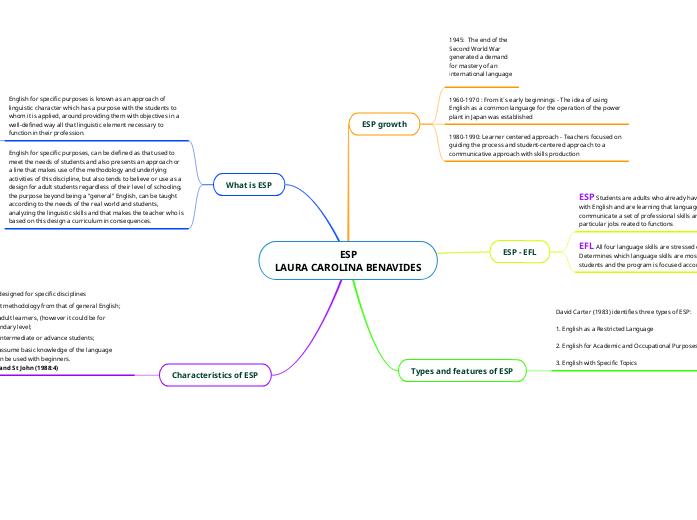ESP
LAURA CAROLINA BENAVIDES
ESP growth
1960-1970 : From it´s early beginnings - The idea of using English as a common language for the operation of the power plant in Japan was established
1980-1990: Learner centered approach - Teachers focused on guiding the process and student-centered approach to a communicative approach with skills production
ESP - EFL
ESP Students are adults who already have some familiarity with English and are learning that language in order to communicate a set of professional skills and to perfom particular jobs reated to functions
EFL All four language skills are stressed equally
Determines which language skills are most needed by the students and the program is focused accordingly
Types and features of ESP
David Carter (1983) identifies three types of ESP:
1. English as a Restricted Language
2. English for Academic and Occupational Purposes
3. English with Specific Topics
What is ESP
English for specific purposes is known as an approach of linguistic character which has a purpose with the students to whom it is applied, around providing them with objectives in a well-defined way all that linguistic element necessary to function in their profession.
English for specific purposes, can be defined as that used to meet the needs of students and also presents an approach or a line that makes use of the methodology and underlying activities of this discipline, but also tends to believe or use as a design for adult students regardless of their level of schooling, the purpose beyond being a "general" English, can be taught according to the needs of the real world and students, analyzing the linguistic skills and that makes the teacher who is based on this design a curriculum in consequences.
Characteristics of ESP
* related to or designed for specific disciplines
* use a different methodology from that of general English;
* designed for adult learners, (however it could be for learners at secondary level;
* designed for intermediate or advance students;
* ESP courses assume basic knowledge of the language system, but it can be used with beginners.
(Dudley-Evans and St John (1988:4)
